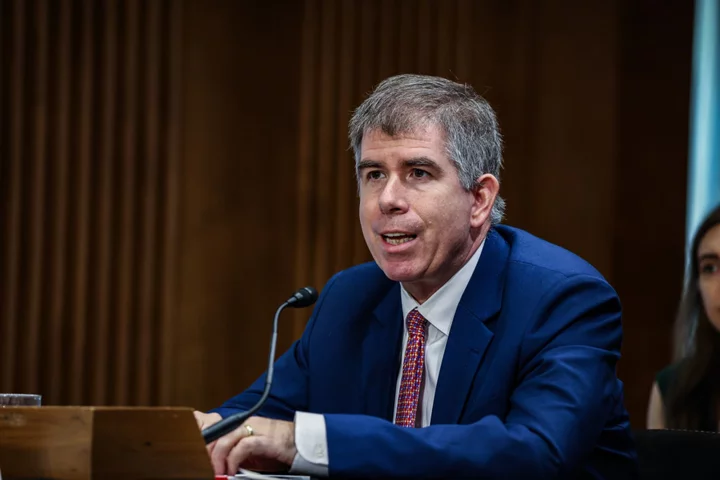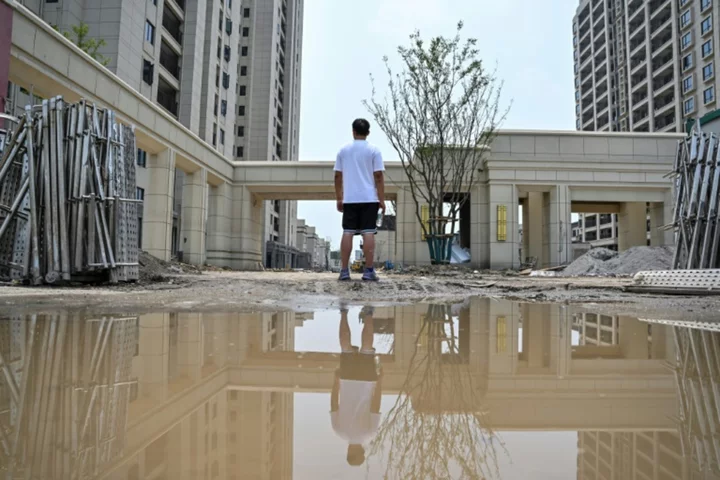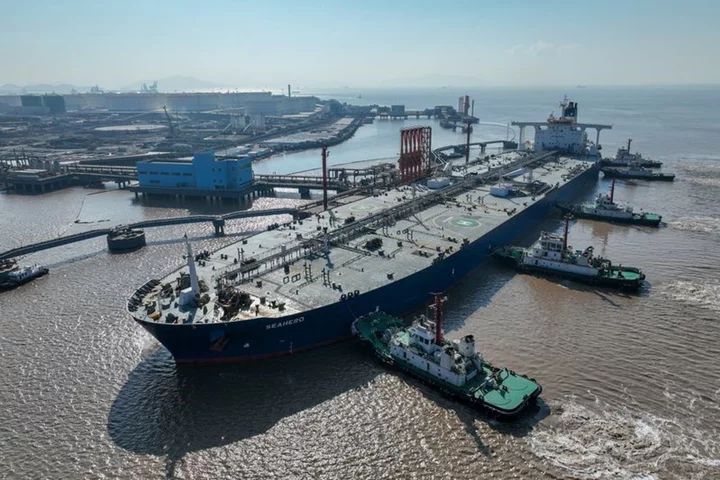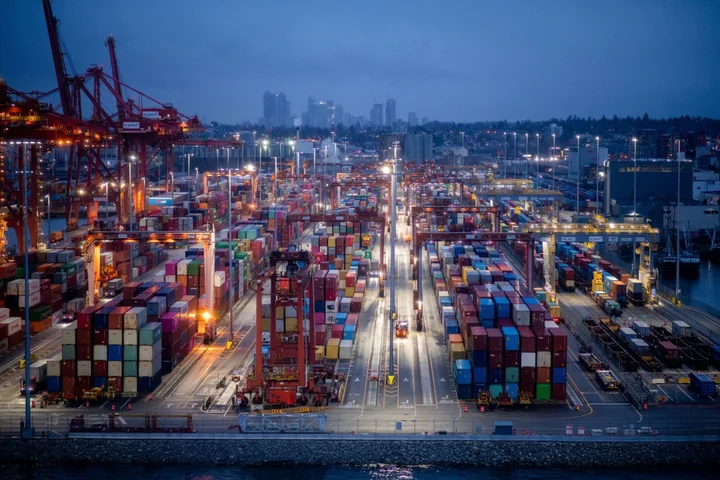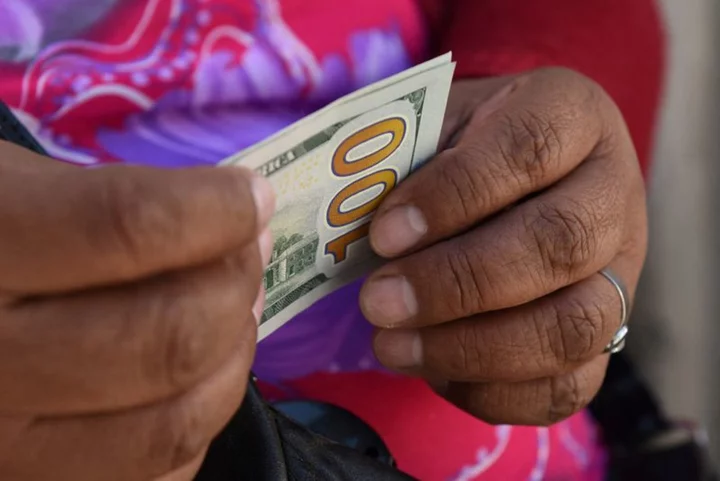The US called for reforms at the International Monetary Fund that will increase its lending firepower and refocus its efforts toward financial stability, Washington’s latest effort to bulk up the influence of major Western development institutions amid its global drive to counter China.
The focus on strengthening the IMF was unveiled Thursday as President Joe Biden heads to the Group of 20 leaders’ summit in India, where he plans to make promoting the emergency lender, as well as the poverty-focused World Bank, one of his key messages.
Read more: Biden Looks to Woo Back Allies as Putin, Xi Skip G-20 Summit
The move underscores US efforts to use the Washington-based institutions to counter China’s influence and lending power in emerging countries, particularly in the aftermath of the coronavirus pandemic and amid Russia’s invasion of Ukraine.
“This is part of the effort by the Biden administration to get traction, influence and friends in the Global South,” said Hung Tran at the Atlantic Council.
Treasury Undersecretary for International Affairs Jay Shambaugh, who handles Washington’s relationship with the IMF and World Bank, laid out the Biden administration’s goals in a speech Thursday, which also offered veiled criticism of both China and the IMF agenda that’s sprawled beyond its core mission as the monitor of the global economy and emergency lender.
Those steps include increasing member countries’ quotas, which represent their share of the institution’s resources that they can leverage when financial conditions worsen.
Quota Review
“This year, we will support an increase in quotas – for a broad increase across all members – with the goal of strengthening the IMF as a shareholder institution at the core of the global financial safety net,” Shambaugh said at the Center for Global Development in Washington.
The IMF is in the midst of its 16th quota review, which has a deadline of December for completion. Managing Director Kristalina Georgieva has said that the fund’s review of members’ quotas is important for adequately reflecting the current economic weight of member countries, including China. Quota reviews are often accompanied by recalibration of the weight of countries at the IMF board.
US Treasury Secretary Janet Yellen in April called for “a new quota formula that is both fair and simple and primarily reflects the economic size of its member countries.”
But Shambaugh’s call for an increase in quotas didn’t include a redistribution to reflect IMF members’ current share of the global economy, which would change their voting power. The US, for instance, now has the largest voice at around 17%, while China, the world’s second-biggest economy, holds 6%.
‘Political Marketing’
“The quota increase is a political marketing statement,” Tram said. “In terms of vote redistribution, that’s not feasible because of political issues, both domestically and internationally” because it will require congressional approval, which is currently unlikely and would bolster China’s role.
Shambaugh also appeared to take a veiled swipe at China, the biggest bilateral lender to developing economies, when he said US support for changing quota formulas requires “that all countries – especially those that would see an increase in share – are respecting the roles and norms of the IMF and working to strengthen the international monetary system.”
The US and other traditional lenders in the so-called Paris Club have failed to reach broad agreements with Beijing on how to handle those emerging-market debt issues, blaming what they say is Beijing’s intransigence.
“The message on China was hard to miss,” said Karen Mathiasen, a project director at the Center for Global Development and a former Treasury official. “U.S. support for quota increases will be contingent on greater cooperation, especially on debt. Given that meaningful progress on debt is untenable without China, and China’s cooperation remains infuriatingly elusive, using IMF quota reform as leverage is not an unreasonable strategy.”
Core Mission
Shambaugh also warned the IMF against straying from its core role of helping troubled countries avoid and escape economic crisis.
“We cannot let the temptation to address every problem pull the IMF away from its core mission of macroeconomic and exchange-rate surveillance and guidance,” he said. “The IMF should not be experts on climate issues. Instead, it should focus on macro-critical issues and rely on the World Bank and others for sectoral expertise.”
Georgieva, an environmental economist by training, has led an expansion of the IMF’s work since taking over in 2019. That includes incorporation of climate issues in the fund’s annual consultations with its 190 member countries and the creation of a trust to provide long-term lending to vulnerable countries.
Those moves had led to criticism among analysts and staff that the IMF has drifted from its main mission of global financial stability, which has been at its core since its founding near the end of World War II.
Shambaugh’s speech marked the second time in roughly a year that the Treasury has launched an effort to push reforms at a major international financial institution. Last year, Yellen kicked off an effort to drive reforms at the World Bank.
Joint Effort
Separately on Thursday, the IMF and World Bank released a joint statement pledging to collaborate to confront challenges from climate change to rising debt levels, a rare public message of solidarity that seemed to reinforce Shambaugh’s message.
The two organizations, called the Bretton Woods institutions for the New Hampshire mountain resort town where they were created, pledged to deliver “tangible benefits” by “drawing on our respective mandates and expertise.”
Those are “the World Bank’s diverse skills and experience, including on sustainable growth and structural transformation and its significant footprint in client countries.” And for the IMF: “capabilities to support macroeconomic and financial stability, and promote economic conditions conducive to growth and sustainability.”
(Updates with comment in fourth paragraph.)

